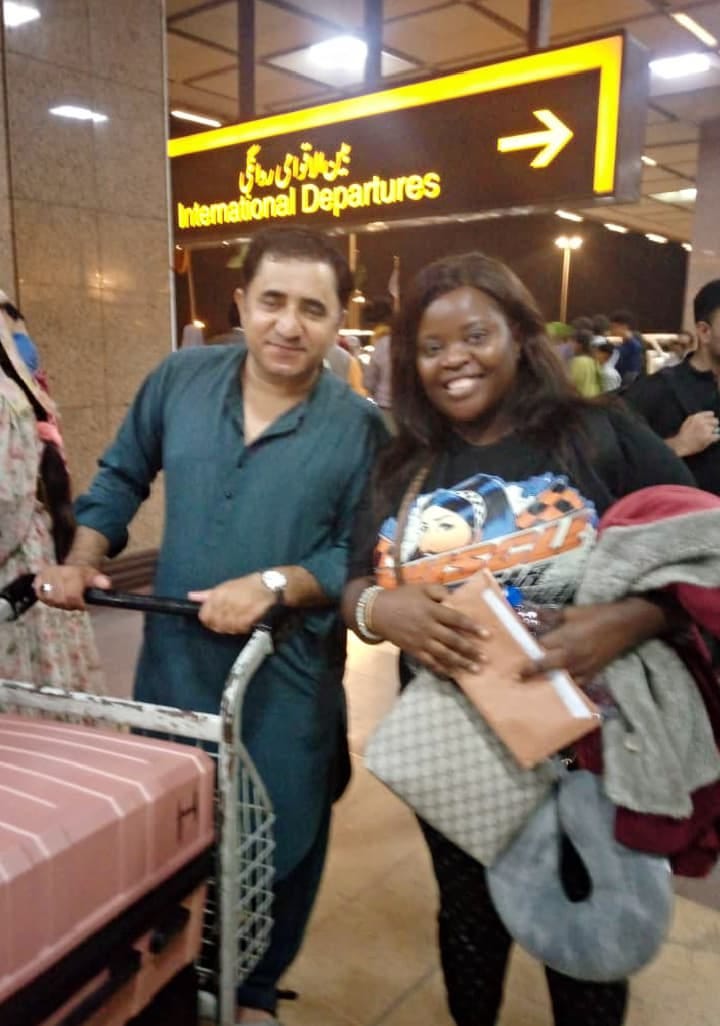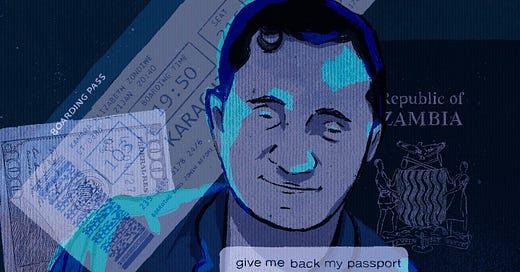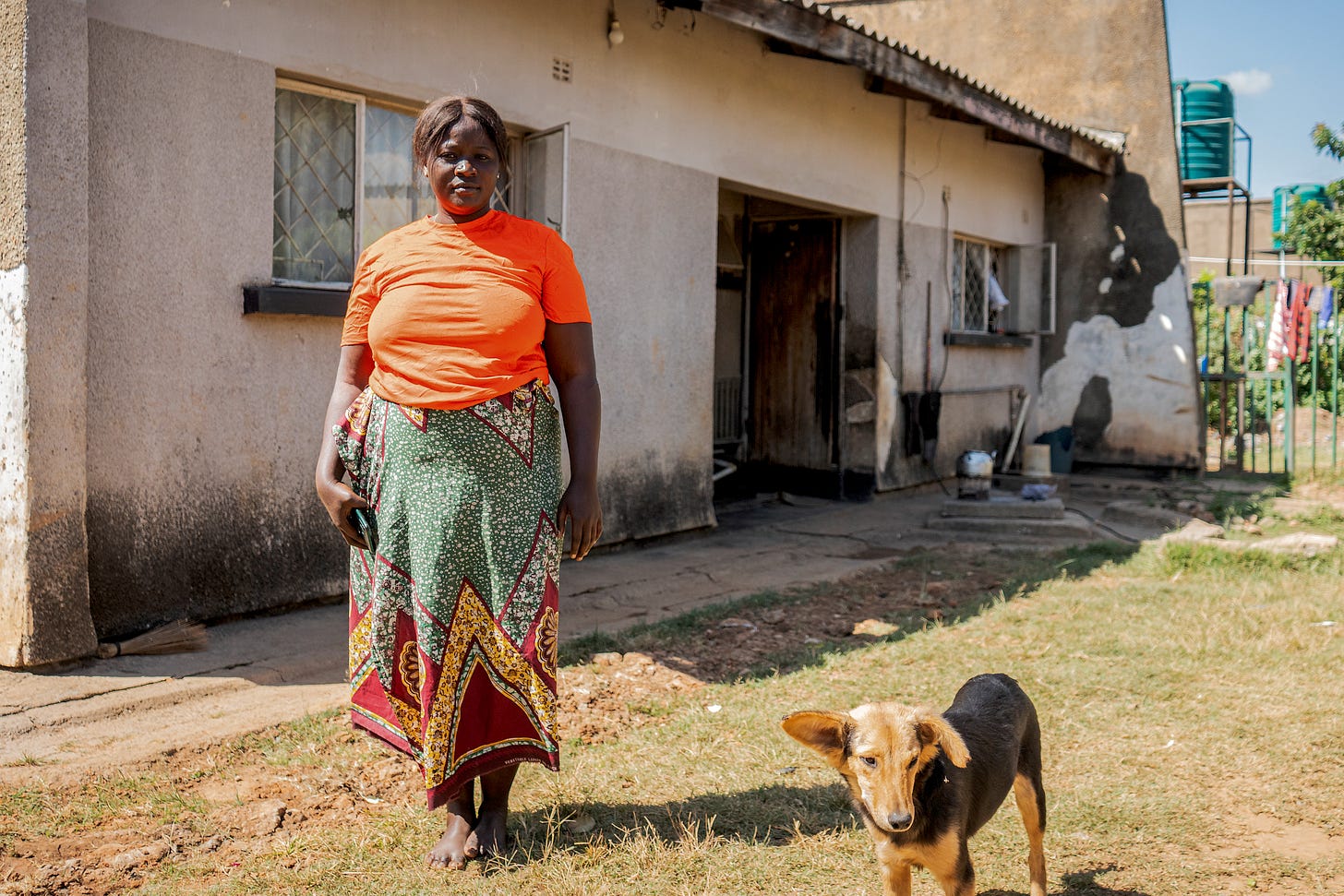Unmasked: The man trafficking Zambian women to Pakistan
Women are being lured to work in terrible conditions, then abandoned without their passports or hope of getting home. And the man responsible is still profiting, despite the authorities knowing about
Annie Zulu in Lusaka
When a friend connected Blessings Banda* to a recruitment agent via WhatsApp, she rejoiced at the prospect of earning a decent living. Three years later, she is stuck in Pakistan with a two-month-old baby, destitute and unsure of when she will return home.
This investigation, which includes undercover reporting, found that the man who hastily arranged her travel – only to confiscate her passport before abandoning her to abusive employers – continues to recruit Zambian women, even though his actions are known to the authorities.
That man, who identified himself to Banda as Jam Hussain, promised safe domestic work in return for a salary of $300 a month. The statutory minimum for that kind of work in Zambia is just over $50.
“I thought this was my chance to change my life and give my child a better future,” said Banda. At 22, she had one child back home in the Copperbelt province. In a few weeks she had a passport and Hussain told her to take the bus to Zimbabwe where she could get a visa and plane ticket to Pakistan.
This exploited a loophole in human trafficking oversight. South Asia has long drawn international criticism for mistreating foreign domestic workers. This means more scrutiny. But because Zambia is not seen as a major source of low wage workers to the region, someone coming from there through Zimbabwe to Pakistan doesn’t raise red flags.
On the bus to Harare, Banda travelled with two other women recruited by Hussain. He picked her up after arrival in Karachi. It all seemed to be going really well. They went to his home and office.
Then he took her passport.
Shortly after, the two went to Lahore, where she was left in the home of an elderly woman with three children and grandchildren. She was offered a tiny, windowless room with a broken bed and thin blanket and told she was not allowed to leave the house.
Banda said she worked long hours on little food, often surviving on scraps and just three hours of sleep a night. Her employer called her a “dog” and other slurs, and halved her salary to $150, which she received only once.
When Banda complained to Hussain, he ignored her. When she confronted her employer about the pay, she was thrown out of the home. “I had nowhere to go. I slept outside that night, hungry and cold. I cried until morning.”
She found a group of stranded Zambian women, some of whom had also been lured in by Hussain. Some had turned to prostitution to survive.
Hussain later placed her with another employer, but the work conditions were even worse. She said she was mocked for her race, sexually harassed by the male employer and even threatened with a gun. Fearing for her life, she left. Since then, she has lived precariously in Lahore for nearly two years. She contacted Hussain on several occasions to ask to return home, but he demanded a “release fee” of $450.
She then kept falling ill and took pregnancy and HIV tests. Both were positive. Without legal documentation, she couldn’t get ARVs from local hospitals and relies on Septrin, an over-the-counter antibiotic that is often prescribed to people with HIV in Africa to prevent infections like malaria and pneumonia. Close to her due date in April, Hussain released her passport so that she could get the urgent medical care she needed.

The Zambian embassy in China, which ostensibly covers Pakistan, has recently been in touch about repatriation. Progress is slow and she hasn’t had any financial help. “I want to go home to my family. I don’t want to die here.”
An all-too-common ordeal
In this investigation, we spoke to two other Zambian women in Lahore and Karachi who say they were recruited by the same man. “My boss calls me mad and blames me for things I haven’t done,” said one woman. “I asked Hussain for my passport to go home, but he refused. I’ve lost hope.”
“I am only surviving,” said the other woman, adding that she works long hours, is barely fed, and sleeps on a torn mattress, in a dank, windowless room.
Because Zambia does not have an embassy in Pakistan, women in this situation have turned to social media to get noticed. Two of them, Adolphine Lupasha and Juliet Chali, told this investigation they were recruited by Hussain. They both described trajectories like Banda’s: passport confiscated, pay halved and/or withheld, and horribly abusive employers.
They said Hussain receives lump-sum payments from Pakistani employers, which he uses to fund their travel, keeping what’s left. The employers then justify not paying the women because they paid Hussain upfront.
Zambian authorities know
Chali’s very public plea, which led to the International Organization for Migration co-ordinating her return in 2023, should have quickly brought Hussain’s actions to the attention of authorities.
But in February 2025, this reporter posed as a single mother seeking work and messaged Hussain. He responded in minutes with a voice note to ask, “who gave you my number?” Satisfied with the response – that a friend’s cousin had done the referral – he replied: “Send me your passport fast”. No questions were asked about experience.
In March, Zambian authorities intercepted three women recruited by Hussain after the mother of one of them contacted authorities and this investigation. Boris Mulengu, director of Zambia’s Anti-Human Trafficking Department, admits there are loopholes in the exit process traffickers can exploit. “People leaving are not necessarily required to show contracts. Many don’t say they’re going for work.” Zambians can travel to Pakistan with an e-visa that can be processed online within 48 hours.
The department said in May – weeks after they were alerted to Banda’s plight and other cases – that a committee had been set up to investigate the rise in cases of trafficking women to Asian countries.
The enabling network
Hussain works with Zambian accomplices, known to the women by vague aliases. One, “Mr Ron” in Lusaka, arranged transport through R & R Traveling Consultancy, which is not on Zambia’s business registry. A “Mr Kasonde” housed the women en route to Zimbabwe. Via phone, a “Madam Martha” admitted to connecting girls to Hussain for a commission.
We found no record of Hussain’s Al-Hassan Employment Services in the Pakistani business registry. A Facebook page with that name has not been updated since 2017. In a 2019 YouTube video, the agency invites recruits from Zambia and Nigeria, among other countries, to look for “better opportunities”. The video was still up at the time of publication.
We gained access to Hussain’s restricted personal Facebook page with the help of a trafficking survivor and found more than 10 undated photos of newly arrived Zambian women, taken in his office and at airports.
Contacted via WhatsApp and presented with the details of the claims in this story, Hussain threatened to block the reporter. The Facebook page named Al-Hassan Employment Services – which had 498 followers – was deleted after that interaction. He similarly refused to answer questions from The Continent’s editor.





